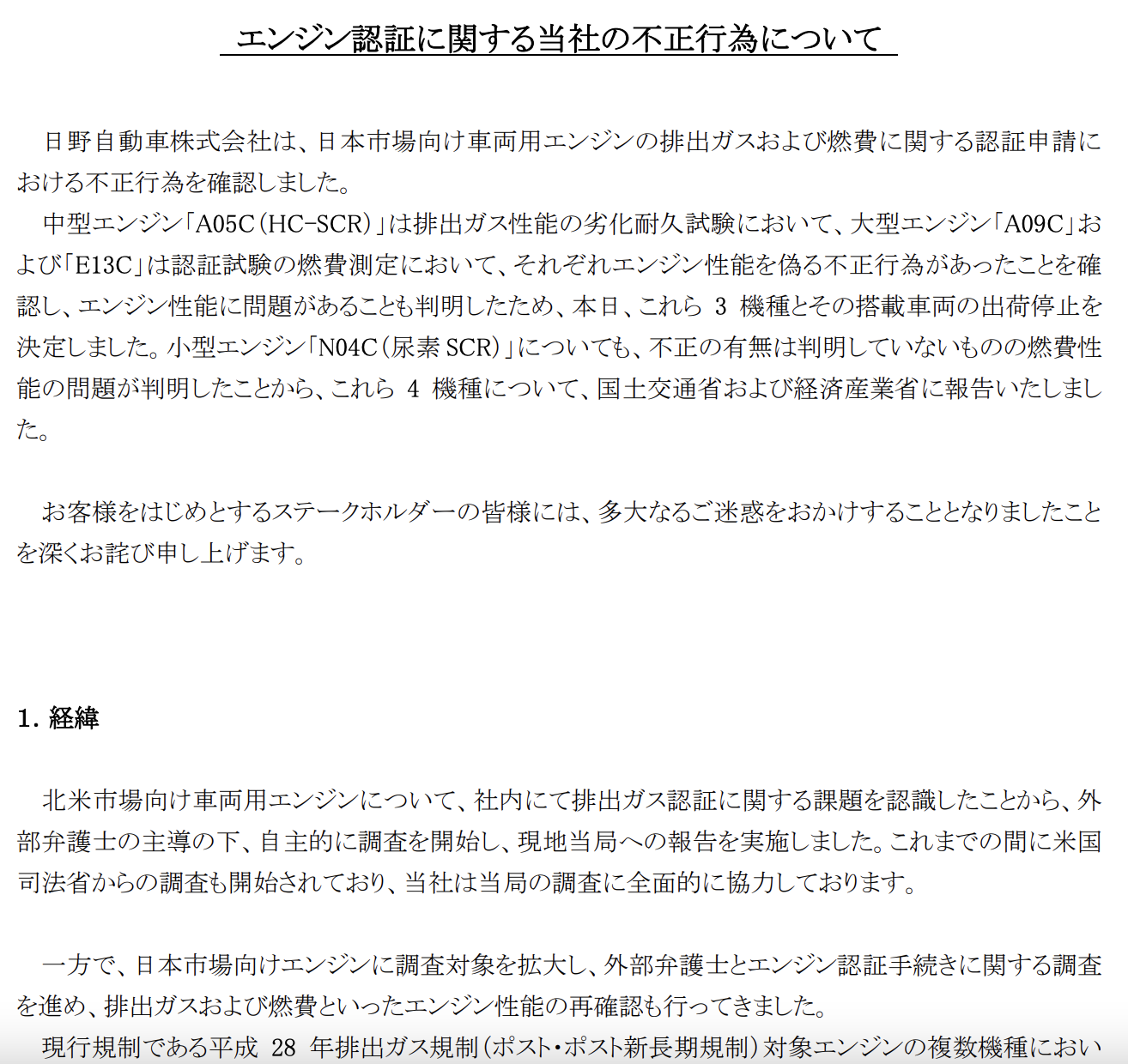In addition to Weibo, there is also WeChat
Please pay attention

WeChat public account
AutoBeta


2024-11-17 Update From: AutoBeta autobeta NAV: AutoBeta > News >
Share
AutoBeta(AutoBeta.net)03/07 Report--
Recently, Toyota's Hino Motors announced that its internal investigation found that engine data fraud at the factory has lasted for many years, affecting as many as 115000 vehicles, almost twice as many as Hino's annual sales in Japan. According to the announcement, the misconduct occurred at the Japanese factory where the engine was tested in Hino. During the test of one of the engines, the testers directly replaced the exhaust system parts to make the test results as expected because the results were substandard.

It is understood that Hino found that the vehicle engines shipped to the North American market did not comply with US regulations as early as 2018, so he decided to conduct an internal investigation into possible violations in the factory. Since then, Hino Motors has expanded its investigation to include engines in the Japanese market, exposing the wrongdoing, which dates back to 2016, when Mitsubishi Motors was thrown into turmoil by a fuel economy data scandal.
On the same day, Japan's Ministry of Land and Transport said that Hino's data manipulation had "eroded the trust of car consumers and shaken the foundation of the testing and certification system," and asked Hino to conduct a thorough investigation into the matter and explore future preventive measures. In addition, the department also issued an investigation order against seven heavy truck manufacturers, including Toyota and Isuzu, requiring them to report violations by April 8.

In response to Hino's misconduct, a Toyota spokesman said, "Hino must first assume responsibility, find out the truth as soon as possible, and take comprehensive preventive measures." In addition, Toyota made a public apology on its website. However, Toyota also said that the engine performance found this time has no impact on driving function, nor does it pose a safety hazard.

Hino, founded in 1942 and headquartered in Hino City, Tokyo, Japan, specializes in commercial products for trucks and passenger cars, and occupies a leading position in the manufacturing of medium and heavy diesel trucks in Japan, according to official data. At the same time, Hino's controlling shareholder is Toyota Motor Group. According to Toyota's website, Hino Motor sold 155212 vehicles worldwide from January to December 2021, of which 59935 were sold in Japan.

Because of its market position in commercial vehicles, Hino Motor has set up a joint venture with GAC GROUP in China. Data show that Guangzhou Automobile Hino Automobile Co., Ltd. (hereinafter referred to as "Guangzhou Automobile Hino") was established on November 28, 2007, jointly established by Guangzhou Automobile Group Co., Ltd. and Hino Automotive Co., Ltd., according to the way of "one project, two bases" to reorganize Guangzhou Yangcheng Automobile Co., Ltd. And Shenyang Shenfei Hino Automobile Manufacturing Co., Ltd.
In addition, on October 21, 2020, BYD Automotive Industry Co., Ltd. signed a joint venture agreement with Hino Automotive Co., Ltd., each of which plans to set up a joint venture company in China in 2021 to jointly develop pure electric commercial vehicles and electric vehicle parts. However, the joint venture between BYD and Hino Motors has not yet landed.

In recent years, it is not uncommon for Japanese manufacturing enterprises to falsify their data.
In October 2017, Kobe Steel admitted to tampering with some copper and aluminum product inspection data to supply customers with shoddy products involving about 200 companies such as Toyota and Mitsubishi heavy Industries, as well as automobiles, aircraft, high-speed trains, military industry and other fields. what is even more outrageous is that the wrongdoing existed as early as the 1970s. In November of the same year, Mitsubishi Electric Wire Industry and Mitsubishi Copper were exposed to tamper with product data fraud, affecting 258 enterprises. In July 2018, Nissan admitted that it had falsified emissions and fuel consumption measurements at five factories in Japan, accounting for 53.5% of the total sample.
To make matters worse, in October 2020, CCTV Finance quoted Japanese media as saying that Japan's largest supplier of car seat belts, Japan Junsheng Safety Systems Co., Ltd., was accused of "data tampering" on some seat belts that did not meet the strength test standards. These "substandard" products also entered the car companies. In Japan alone, there may be 9 million substandard seat belts, involving about 2 million vehicles, including 10 Japanese car companies, including Toyota, Honda and Nissan. All use the products provided by the company.

The falsification of test data has been banned repeatedly, first of all, due to the long-standing problem of inadequate supervision of front-line production in the Japanese manufacturing industry. Industry insiders pointed out that some Japanese manufacturing companies are too confident that there will be no problems with their products, so they do not carry out all kinds of tedious inspections in accordance with the contract. In addition, aging equipment and understaffing are also important factors leading to counterfeiting.
As a country with industry as its development, the reliability of its industrial standards has been widely recognized internationally, but the frequent incidents of data fraud in recent years affect not only the trust and interests between enterprises, but also pose a threat to the safety of consumers.
Welcome to subscribe to the WeChat public account "Automotive Industry Focus" to get the first-hand insider information on the automotive industry and talk about things in the automotive circle. Welcome to break the news! WeChat ID autoWechat
Views: 0
*The comments in the above article only represent the author's personal views and do not represent the views and positions of this website. If you have more insights, please feel free to contribute and share.











© 2024 AutoBeta.Net Tiger Media Company. All rights reserved.